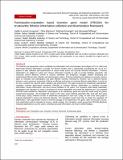| dc.description.abstract | The fisheries and aquaculture sectors worldwide use Information and communication technologies (ICT) to collect and disseminate fisheries information. Currently, the African member state is significantly strengthening the use of ICT systems in data collection and dissemination to ensure timely access and accurate fisheries information. Fisheries stakeholders are obliged to submit and retrieve information honestly as well as provide feedback voluntarily. We conducted ancient literature reviews to discover worldwide and indigenous struggles towards developing and implementing fisheries data collection and dissemination systems. Existing worldwide and indigenous innovation systems bases on voluntary user participation and lacks effective incentive mechanisms. However, due to dishonest human behavior, such a promise is impractical. Without an efficient mechanism to incentivize fisheries stakeholders, it would not be easy to achieve the required system adoption and performance. This paper proposed an evolutionary participation-reputation incentive game-based mechanism (PRIGM) to motivate fisheries stakeholders to contribute accurate information, retrieve information, and return honest feedback to the system. Our proposed model adopts stakeholder participation and reputation as merit to incentivize the honest stakeholder and punish the dishonest one. Our proposed PRIGIM model modeled the stakeholder's participation as an evolutionary game and coded the model using the python programming language. We simulated the model in five cases using randomly generated data, each with four-game rounds plays, using a different number of stakeholder participants in each case. Lastly, we used a bar chart graph to evaluate stakeholder's honest and dishonest behavior. The simulation results show that no matter the population of stakeholders, many stakeholders choose a dishonest strategy at the beginning of the game; after several game rounds, most stakeholders will be motivated to choose a simple strategy. Our simulation results proved that PRIGIM effectively motivates stakeholders to use the system, contribute accurate information, and return truthful feedback. | en_US |

